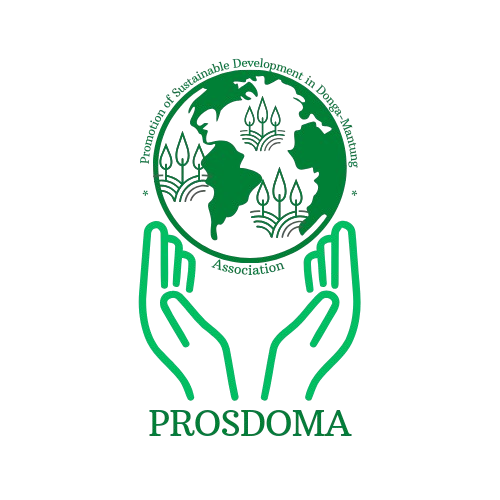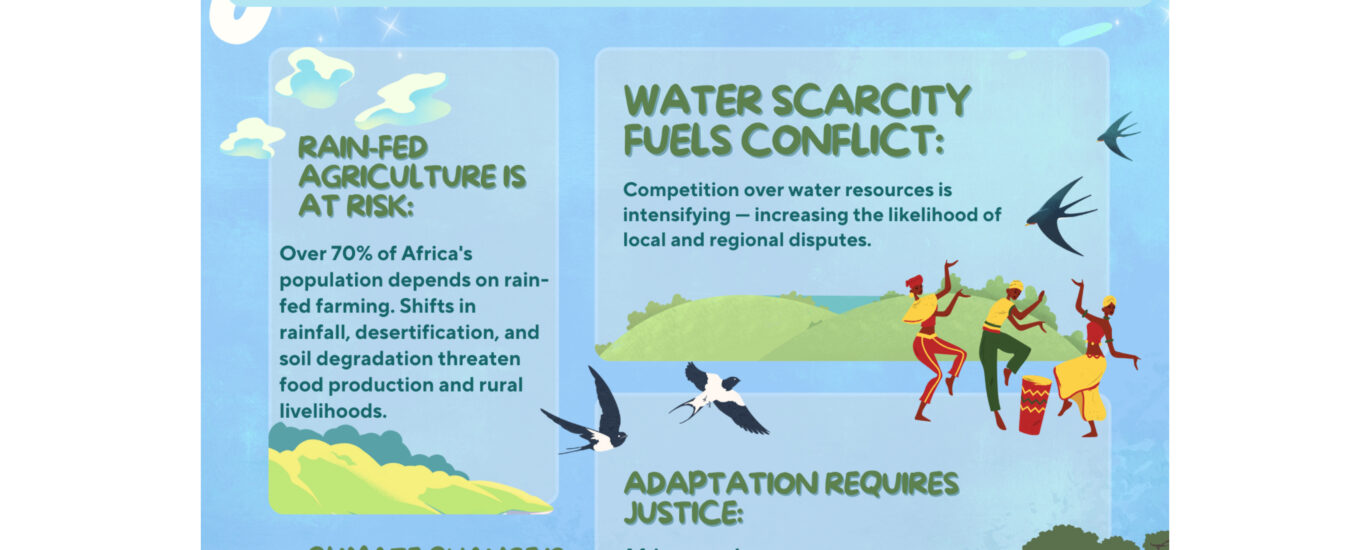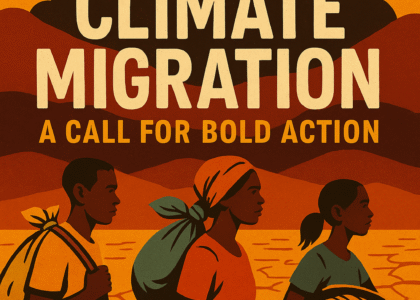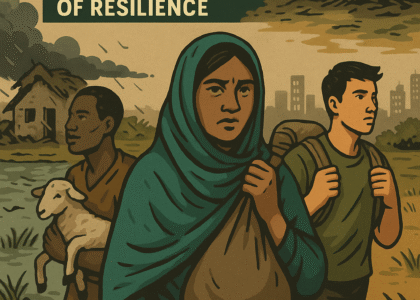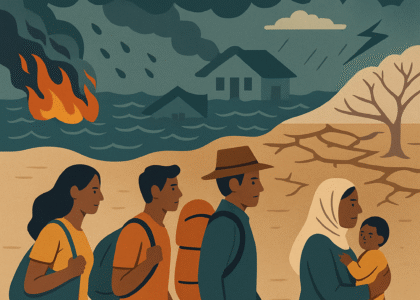Africa contributes the least to global greenhouse gas emissions — yet faces some of the harshest consequences of climate change. From rising sea levels and prolonged droughts to food insecurity and political instability, the continent is on the frontlines of a crisis it didn’t cause.
📊 Recent research shows that climate change is already undermining Africa’s development prospects, increasing poverty, and placing enormous strain on agriculture, water systems, and human security (Tadesse, 2010).
🔍 Here are 4 urgent truths we must confront:
1️⃣ Rain-fed agriculture is at risk.
Over 70% of Africa’s population depends on rain-fed farming. Shifts in rainfall, desertification, and soil degradation threaten food production and rural livelihoods.
2️⃣ Water scarcity fuels conflict.
Competition over water resources is intensifying — increasing the likelihood of local and regional disputes.
3️⃣ Climate change is a threat multiplier.
It worsens existing vulnerabilities like poverty, migration, and food insecurity.
4️⃣ Adaptation requires justice.
Africa needs support not as charity, but as climate justice — including funding, data access, and inclusive decision-making.
💬 So, what can be done?
✅ Increase international climate finance directed to African-led solutions
✅ Strengthen early warning systems and local adaptation capacity
✅ Invest in sustainable agriculture, water access, and youth-led innovation
✅ Center African voices in global climate negotiations
💚 At PROSDOMA, we put these solutions into practice — from supporting agroecology and water education in West Africa to climate literacy and integration support for migrants in Canada.
📩 Join the mission: prosdoma.org/
By E.D.
📚 Source: Tadesse, D. (2010). The Impact of Climate Change in Africa. ISS Paper 220. Institute for Security Studies.
https://www.issafrica.org
#ClimateJustice #AfricaClimateCrisis #Prosdoma #SustainableDevelopment #WaterSecurity #AdaptationNow #ClimateAction #FoodSecurity #EnvironmentalEquity #YouthForClimate
🌾 Food Security in Africa: A Call for Long-Term, Community-Led Action
Climate change, HIV/AIDS, population pressures, and recurring disasters are placing millions of African lives at risk from chronic food insecurity. But short-term fixes won’t solve long-term hunger.
📊 Recent program data from the International Federation (2008) shows that holistic, integrated approaches are essential for building lasting food security. A five-year strategy engaging 15 African National Societies, from Uganda to Swaziland emphasized community-based action, multi-sector coordination, and sustained investment.
🔍 4 key takeaways:
1️⃣ Food security must be community-driven.
Projects rooted in local leadership and knowledge — like communal gardens or nutrition training — see higher success and long-term engagement.
2️⃣ Integration is key.
Food security works best when paired with health (e.g. HIV care), water, sanitation, and climate adaptation efforts.
3️⃣ Vulnerability must shape priorities.
Reaching the 20% most at-risk populations, especially women, children, and HIV-affected households, is essential for equitable progress.
💬 What can be done?
✅ Fund long-term national food security plans
✅ Support African-led frameworks with local ownership
✅ Link food, health, and disaster preparedness strategies
✅ Empower grassroots institutions to lead
💚 At PROSDOMA, we apply these principles every day from regenerative farming in Cameroon to food justice education for newcomers in Canada. We know that resilience grows from the roots up.
📩 Learn more or partner with us: prosdoma.org/
By E.D.
📚Source: International Federation of Red Cross and Red Crescent Societies. (2008). Food Security in Africa. Appeal No. MAA00023. https://www.ifrc.org/docs/appeals/annual08/MAA0002308pu1f.pdf
#FoodSecurity #AfricaDevelopment #ClimateJustice #HIVandHunger #IntegratedApproach #Prosdoma #CommunityResilience #Agroecology #WaterSanitationHealth #LongTermImpact #DisasterPreparedness
🌍 Sustainability in Africa: Beyond Land, Beyond Yields
Africa is rich in natural resources, cultural diversity, and ecological potential. Yet environmental degradation, social inequalities, and the impacts of climate change continue to limit the continent’s capacity to develop equitably and sustainably.
📊 Recent research highlights that while agricultural modernization is increasing production, it also exacerbates land degradation, water stress, and social exclusion, particularly among the landless poor (Whitfield, 2016).
🔍 4 key takeaways:
1️⃣ Agriculture drives both progress and risk.
Modernization and intensification improve yields but often harm ecosystems and displace vulnerable farmers.
2️⃣ Natural resource wealth is poorly shared.
Extractive industries and conservation areas too often benefit elites while excluding local communities.
3️⃣ Food security isn’t just about production.
Rural poor remain malnourished due to seasonal gaps, limited purchasing power, and gender-based inequalities in land access.
4️⃣ Top-down development misses the mark.
Global agendas often ignore local knowledge, power dynamics, and ecosystem realities.
💬 What can be done?
✅ Support agroecology and land rights for smallholders
✅ Integrate food, energy, and water planning
✅ Fund community-led conservation, not just carbon credits
✅ Ensure women and youth lead sustainability transitions
💚 At PROSDOMA, we turn these insights into action. Whether restoring land in West Africa or promoting equitable access to food and resources in Canada, we root sustainability in justice, not just in metrics.
📩 Learn more: prosdoma.org/
By E.D.
📚Source: Whitfield, S. (2016). Environmental and Social Sustainability in Africa. ISPI Background Paper No. 2.https://www.ispionline.it
#SustainabilityInAfrica #Agroecology #ClimateJustice #FoodSecurity #NaturalResourceEquity #Prosdoma #EnvironmentalGovernance #AfricaDevelopment #LandRights #CommunityLedDevelopment
💧🤖 Smart Water, Smarter Futures: How AI Is Reshaping Water Management
Water utilities worldwide face a dual crisis: aging infrastructure and rising climate uncertainty. But artificial intelligence (AI) offers a powerful path forward if used strategically.
📊 Recent research from the Asian Development Bank shows that AI can significantly improve leak detection, demand forecasting, and energy efficiency, saving utilities up to 11% in annual costs while advancing climate resilience and SDG 6 (ADB, 2020).
🔍 Here are 4 key insights:
1️⃣ From leaks to learning.
AI-enhanced hydraulic models (Hydraulic Modeling 2.0) use real-time data to locate pipe bursts, unauthorized use, and sensor failures, turning infrastructure into an intelligent system.
2️⃣ Optimize, don’t overspend.
AI helps utilities place fewer sensors more effectively, reducing unnecessary capital costs while maximizing information flow.
3️⃣ Human behavior matters.
Smart meters and data-driven modeling must account for social patterns, informal connections, and seasonal variation, not just technical specs.
4️⃣ Hybrid approaches work best.
Combining physically based models with machine learning (a hybrid method) leads to better prediction, adaptation, and decision-making.
💬 What can be done?
✅ Invest in AI pilot programs for water utilities
✅ Promote affordable ICT systems for Global South cities
✅ Link digital water tools with public trust and ethics
✅ Support training and inclusive governance in smart infrastructure
💚 At PROSDOMA, we champion climate-tech solutions that prioritize both innovation and justice. Whether it’s smart irrigation in Africa or water literacy for newcomers in Canada — we believe tech must serve people first.
📩 Join us: prosdoma.org/
By E.D.
📚Source: Asian Development Bank (2020). Using Artificial Intelligence for Smart Water Management Systems (ADB Brief No. 143). https://doi.org/10.22617/BRF200191-2
#SmartWater #AIforGood #WaterManagement #ClimateAdaptation #Prosdoma #SustainableInfrastructure #HydraulicModeling #SDG6 #DigitalTransformation #WaterEquity
🌱 When a Tree Grows in School, a Future Takes Root
Planting trees in schools does more than green the landscape, it cultivates climate awareness, food security, and community resilience.
📚 Recent educational guides from Regreening Africa emphasize the transformative role of tree planting in African schools. These programs not only teach environmental stewardship, but also provide shade, nutrition, livelihoods, and learning opportunities (Koech et al., 2022).
🔍 4 key takeaways:
1️⃣ Schools are powerful platforms for change.
Tree planting teaches climate science, teamwork, and long-term care — all within the schoolyard.
2️⃣ The right trees matter.
Fruit trees offer nutrition, shade trees cool classrooms, and medicinal trees support health, all selected based on local needs.
3️⃣ Participation builds ownership.
Engaging students, teachers, and communities ensures long-term care and prevents damage from livestock or neglect.
4️⃣ Composting and nurseries multiply impact.
Schools that establish compost systems and nurseries not only grow trees, but grow skills, jobs, and environmental literacy.
💬 What can be done?
✅ Support school-based agroforestry education
✅ Fund school nurseries and climate clubs
✅ Promote girls’ leadership in environmental action
✅ Integrate tree planting into national education strategies
💚 At PROSDOMA, we believe that classrooms can be climate labs. From planting trees in African villages to teaching climate justice in Canadian schools, we root learning in the land.
📩 Join our mission: prosdoma.org/contact
By E.D.
📚 Source: Koech, G., Tengetile, Z. M., & Bourne, M. (2022). Guide on Planting Trees in Schools. World Agroforestry (ICRAF), Nairobi, Kenya.
#TreePlanting #SchoolForestry #ClimateEducation #GreenSchools #Agroforestry #Prosdoma #EnvironmentalLiteracy #YouthForClimate #FoodSecurity #NatureInEducation #RegreeningAfrica
#prosdoma

